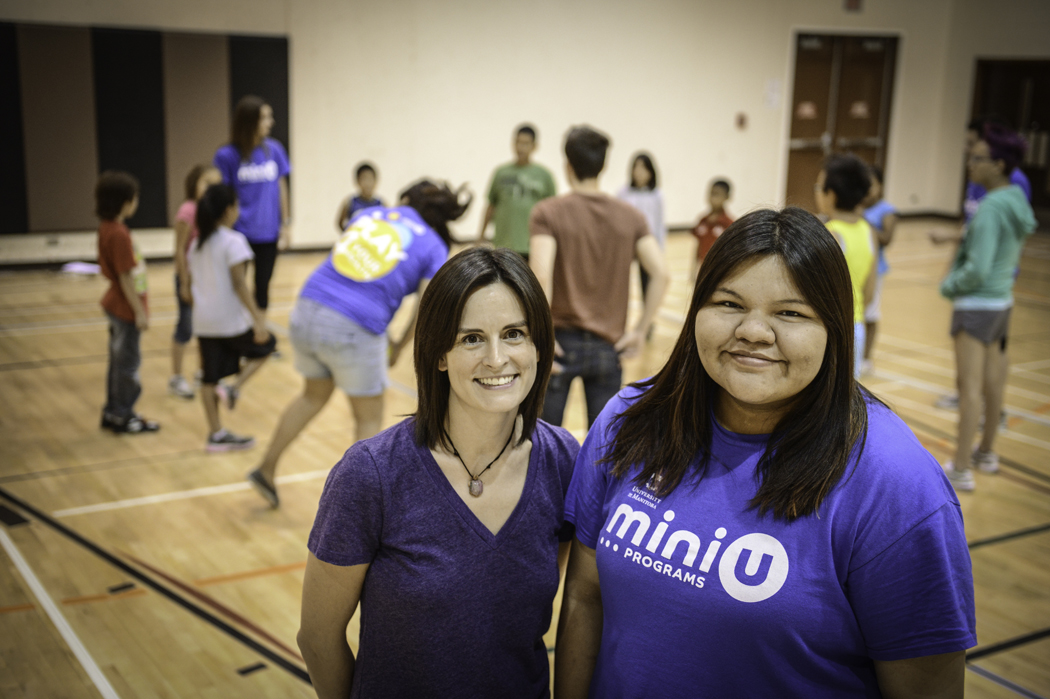
Heather McRae and Seneca Chartrand at the U of M's Indigenous Mini U. // Photo by Mike Latchislaw
Culturally-based camp offered as part of Mini U
Mariianne Mays Wiebe and Heather McRae
The Bulletin
When Indigenous Mini U ended this summer, its participants wanted it to last longer. Sonya Schulzki worked with the program, and said that many of the kids were sad to see it end. “The kids said how much fun they had, and it’s also great for them to see that they are welcome at the university.” The program at the Fort Garry campus included visits to the Aboriginal Student Centre in Migizii Agamik, or Bald Eagle Lodge.
The summer program is the first culturally-based camp offered as part of the University of Manitoba’s Mini U program. The purpose of Indigenous Mini U is to provide an inclusive, welcoming and culturally-affirming summer camp experience for indigenous and inner Winnipeg youth. The camp, which concluded on Friday, July 26, was free to all participants and included transportation and snacks.
30 children and youth from Winnipeg’s culturally-diverse, inner-city commu
nity converged at the Fort Garry campus to play games, have fun, and develop a deeper understanding of Indigenous traditions and activities.
Schulzki, who also works as a program coordinator for Rec’ and Read program which operates through the Faculty of Kinesiology and Recreation Management, was there to provide support to Mini U instructors. The U of M alumna went to school to be a Phys. Ed. teacher, she says, so “it was great to go out and play with the kids after being in an office for the past year.”
Part of what made the work special, according to Schulzki, was “seeing the kids learning more about their own culture and hearing them tell about themselves and their backgrounds.” The sharing circle was a particular highlight, because it allowed the participants to share their stories.
A highlight for Sonya Schulzki: ‘Seeing the kids learning more about their own culture and hearing them tell about themselves and their backgrounds’
The camp offered the same benefits of the regular Mini U camp — active play, creativity and leadership development — but also integrates important lessons and activities that teach camp participants about their cultural traditions and identity. By fostering a positive cultural identity and sense of belonging among Indigenous and inner-Winnipeg youth, Indigenous Mini U hopes to encourage camp participants to see post-secondary education as an achievable future goal.
Cultural activities included pow-wow dancing, Michif language lessons, Seven Teachings, Metis history and traditions, and a traditional Aboriginal games workshop. Through these and other activities, camp participants learn about the deep influence that indigenous cultural traditions and practices have had, and will have, on their collective past, present and future.
Partners working with Mini U on this initiative include Deborah Young, Executive Lead of Indigenous Achievement and the Faculty of Kinesiology and Recreation Management. Special thanks to David Budd of Ma Mawi Wi Chi Itata Centre Inc., Shirley Delorme Russell of the Louis Riel Institute/Manitoba Metis Federation, and Norman Fleury, a Michif elder who provided traditional teachings at the camp.
Two Indigenous Mini U camps were offered: one at the Fort Garry campus and one for inner-Winnipeg youth, hosted at the Bannatyne campus.






